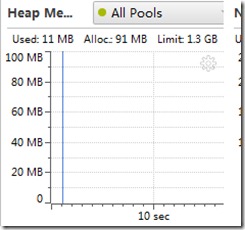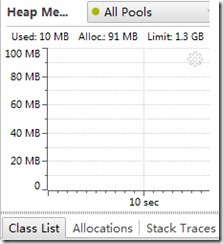需求:写一个程序,分析一个文本文件中各个词出现的频率,并且把频率最高的10个词打印出来。文本文件大约是30KB~300KB大小。
1.思路
①数据结构:Word类封装单词String和频率count,并重写equals方法,以key(String)相同则认为Word对象相同。
先从dictionary.txt一行一行读取字符串,使用正则表达式过滤出单词并存放在ArrayList中,遍历list,将每个string都封装成Word放入一个WordList中;再使用Collections工具类的sort()方法添加一个按照count值的comparator进行排序。
2.分析
使用YourKit Java Profiler进行性能分析。CPU和内存。
可以看计算340KB的文本用了561毫秒。从图中可以看出,update1方法相当耗时间。因为方法内部,将每一个string进行封装成对象,并使用了indexOf()方法寻找位置后更改。
3.改进分析
如果继续不使用ArrayList存储Word来寻找,而使用HashMap来将String作为key,count作为value,在update方法中,就可以直接使用map的get方法判断是否存在唯一的key(string)。最后使用Map的根据count排序即可。
4.改进实现
public class CountOfWordsTest1 { public static void main(String[] args) { test(); } public static void test() { ArrayList<String> list = readFromFile(); List<Map.Entry<String, Integer>> WordList = countOfWords(list); printList(WordList); } /* * @Description read from file and split String with regex * @return the ArrayList contains words */ @SuppressWarnings("resource") public static ArrayList<String> readFromFile() { ArrayList<String> list = new ArrayList<String>(); BufferedReader br = null; StringBuilder sb = null; try { br = new BufferedReader(new InputStreamReader(new FileInputStream( "./src/dictionary.txt"))); sb = new StringBuilder(); String line; while ((line = br.readLine()) != null) { sb.append(line + " "); } } catch (IOException e) { e.printStackTrace(); } // 提取读出来的单词(出去特殊字符) String regEx = "[a-zA-Z]+"; Pattern p = Pattern.compile(regEx); Matcher m = p.matcher(sb); while (m.find()) { String temp = m.group(); // System.out.println(temp); list.add(temp); } return list; } /* * @Description get every word from list and add it to map,then sorted * @param list contains all the word * @return map with key-String and value-count */ public static List<Map.Entry<String, Integer>> countOfWords( ArrayList<String> list) { Map<String, Integer> adjWords = new HashMap<String, Integer>(); for (int i = 0; i < list.size(); i++) { String temp = list.get(i); update(adjWords, temp); } // 将adjWords并转换成list按count排序 ArrayList<Map.Entry<String, Integer>> WordList = new ArrayList<Map.Entry<String, Integer>>( adjWords.entrySet()); Collections.sort(WordList, new Comparator<Map.Entry<String, Integer>>() { @Override public int compare(Map.Entry<String, Integer> o1, Map.Entry<String, Integer> o2) { Integer temp1 = o1.getValue(); Integer temp2 = o2.getValue(); return temp2.compareTo(temp1); } }); return WordList; } /* * @Description count++ if existed or put(string,1) to the map * @param map adjWords to record string and count * @param s the new String */ public static void update(Map<String, Integer> map, String s) { Integer count = map.get(s); if (count == null) { count = 1; } else { count++; } map.put(s, count); } /* * @Description print the list Sorted by count */ public static void printList(List<Map.Entry<String, Integer>> WordList) { // for (Map.Entry<String, Integer> entry : map.entrySet()) { // String key = entry.getKey(); // Integer value = entry.getValue(); // System.out.println(key + "..." + value); // } for (int i = 0; i < 10; i++) { Map.Entry<String, Integer> entry = WordList.get(i); String key = entry.getKey(); Integer value = entry.getValue(); System.out.println(key + "..." + value); } } }
5.性能分析
可以看出,update方法使用的时间明显的改进。整个程序的时间消耗也有了较大的提高。现在最耗时的消耗是对文件的读取和使用正则表达式的匹配处。
![6(_8ER1V2GR]C`F0WPC]M1Y 6(_8ER1V2GR]C`F0WPC]M1Y](http://images0.cnblogs.com/blog/612168/201403/162038025582135.jpg)

![Z%TA(N07HFU7WKO6PK52]ZA Z%TA(N07HFU7WKO6PK52]ZA](http://images0.cnblogs.com/blog/612168/201403/162038049968190.jpg)
